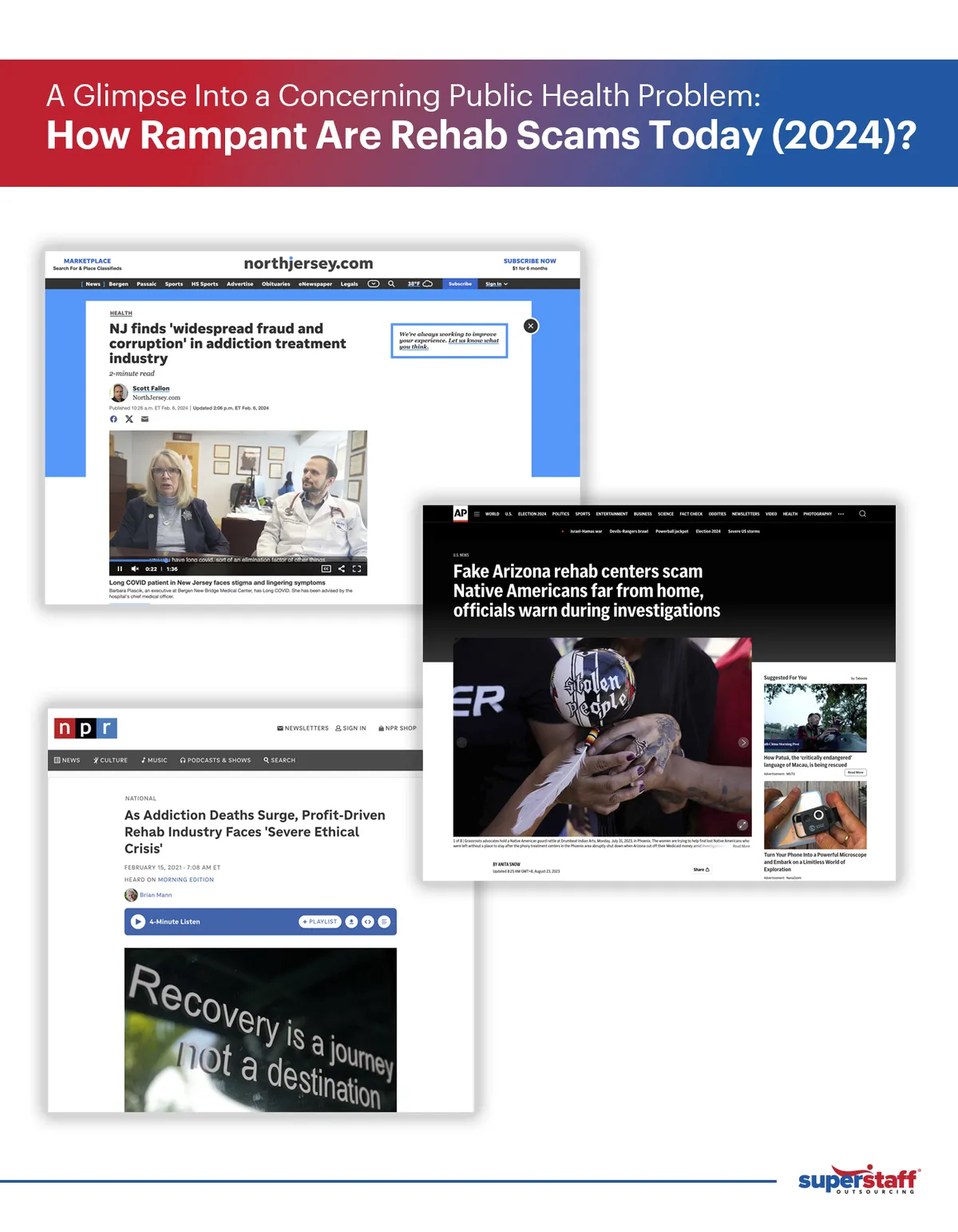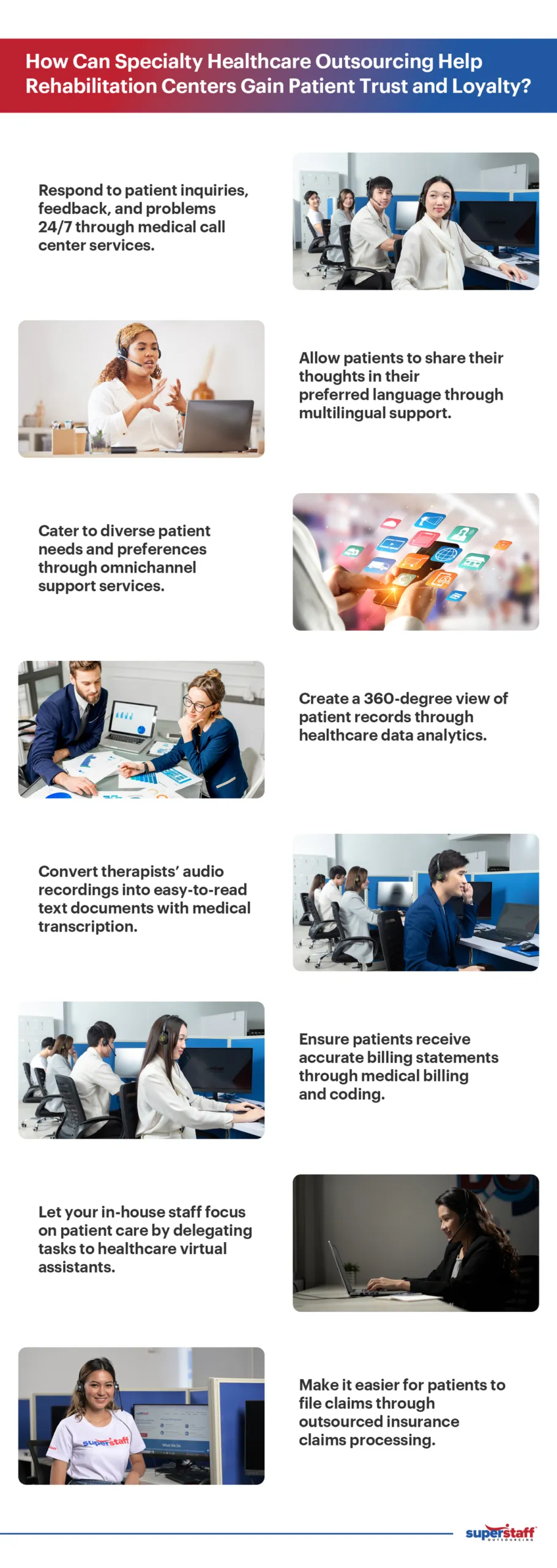
According to the World Health Organization, over 2.4 billion people worldwide deal with health conditions that can be treated or managed through proper rehabilitation. However, not everyone who benefits from treatment chooses to go to rehabilitation centers.
The reasons include the lack of financial resources or inaccessibility of insurance coverage. The same WHO report stated that over half of people living in low- and middle-income countries do not receive the therapy and rehabilitation services they need.
For people who can afford to stay at a rehabilitation center but choose not to, the problem may be more complex. They may inherently distrust treatment facilities because they had fallen prey to (or at least knew people who’ve experienced) rehab scams.
Addressing the growing crisis of patient distrust must be a top priority for rehabilitation and treatment centers. By investing in patient support through outsourcing, these medical providers can earn back the trust of disillusioned rehabilitation clients, provide better patient care overall, and, ultimately, help improve the quality of life of people living with addictions or chronic health conditions.
A Glimpse Into a Concerning Public Health Problem: How Rampant Are Rehab Scams Today (2024)?
Unfortunately, there is a legitimate reason for patients to mistrust some treatment facilities. Past and recent headlines have highlighted the widespread problem of supposed rehabilitation centers that focused more on making profits instead of genuinely helping patients recover from addiction.
A 2021 NPR news story reported a growing number of for-profit rehabilitation facilities that used misleading sales tactics to lure patients into their fraudulent schemes and charged inflated fees for addiction recovery. The scammers often demanded a lot of cash upfront, averaging $17,000 in credit card fees before checking the patient’s medical records and evaluating their needs.
The problem with rehab scams has persisted until the present day, and unfortunately, indigenous and black patients or other racial minorities have been increasingly targeted by scammers. An AP News report found that hundreds of Native Americans in the Phoenix area were the victims of a rehab center billing scheme, leaving many clients homeless and without access to proper treatment.

Is There Hope on the Horizon?
In February 2024, lawmakers moved to expand their laws on patient brokering, aiming to improve licensing and inspection standards for rehabilitation and treatment centers. Their mission is to clamp down on deceptive marketing practices, fraudulent solutions, and other unethical practices in the addiction recovery industry.
Unfortunately, these laws may feel too late for many patients needing rehabilitation and therapy. Many have lost their faith in treatment centers, and legitimate rehab providers must now work doubly hard to regain their trust.
The Growing Problem of Patient Distrust in Healthcare
Over the past century, patient trust in the healthcare system has steadily decreased. The global pandemic exacerbated the issue, with many people refusing to go to emergency rooms or clinics despite experiencing COVID-19 symptoms.
According to a Deloitte study, nearly one-third of patients admitted to skipping or avoiding medical care because they did not like how doctors or other hospital staff treated them. At the same time, 80% said they refuse to return to the same healthcare provider once they’ve lost trust in them.
Why Is Loss of Trust Damaging to Rehabilitation and Treatment Centers?
Building trust is the foundation of a positive patient-medical provider relationship, and it’s particularly critical for rehabilitation and treatment centers. Suppose a patient doesn’t trust their healthcare provider. In that case, they will be less likely to follow treatment instructions, consume recommended medications, or accept doctor’s suggestions, resulting in worse health outcomes.
Rehabilitation is a long-term commitment requiring patients to trust that their treatment plan works. Without trust, many people will likely give up halfway through their treatment, especially if they’re not yet seeing visible results in their quality of life.
Patient Trust: The Key to Long-Term Rehabilitation Success
To illustrate, let’s take a look at the data and statistics for drug and alcohol addiction rehabilitation. According to American Addiction Centers, about 40-60% of drug and alcohol users relapse during their recovery period.
For individuals who receive a comprehensive treatment plan, complete with follow-up care, their drug and alcohol use declines by 50-70% compared to people who have never received treatment. However, the other unfortunate matter is that less than 42% who enter rehabilitation complete the program.
These numbers tell us that trust is essential to rehabilitation because it helps patients follow through with their long-term treatment plans. If patients don’t trust their provider, they will stop going to the rehab center, making recovery less likely.
The Role of Modern Patient Support Specialists in Nurturing Trust and Loyalty in Rehabilitation
Now that you understand the importance of trust in creating positive health outcomes for rehabilitation patients, what can treatment centers do to gain patient confidence? One effective solution is outsourcing patient support tasks to a reliable BPO partner.
Working with an outsourcing team can provide rehabilitation facilities with three significant advantages: improve operational efficiency, offer 24/7 support, and provide more focused and personalized patient care. Here are just a few of the functions you can delegate to a specialty healthcare BPO provider:

Medical Call Center Services
As mentioned above, rehabilitation requires patients to commit to a long-term treatment plan complete with follow-up care. Sometimes, these patients may have questions and concerns about their therapy or need guidance and support during a vulnerable time in their lives.
By investing in medical call center services, rehabilitation centers can ensure that a qualified representative is always available to reply to patient inquiries, feedback, or problems. They can connect patients with the right treatment providers and help them schedule appointments and follow-up consultations.
Omnichannel and Multilingual Support
Studies have found that at least 37% of men and 22% of women who seek rehabilitation services in the United States are from a racial minority group. However, African Americans and Latinos were 3-8% less likely to complete their treatment and recovery plan.
These numbers illustrate the importance of embracing diversity and inclusion in rehabilitation programs. Treatment centers must help minorities feel welcome when they seek professional help – and this can be done by investing in multilingual support services.
Speak Their Language, Win Their Trust
Catering to diverse patient populations includes speaking their native language. For instance, Latino patients may feel more secure asking for assistance when they can relay their thoughts and concerns in Spanish. Multilingual customer service can help your treatment facility embrace different cultures and show that you value their health and well-being.
Cater to Diverse Needs and Preferences
In the same vein, not every person seeking rehabilitation will be comfortable asking for help over the phone. Some may prefer inquiring about their treatment plans through email, where they can include documents outlining their medical history, or through live chat for real-time communication.
No matter what platform your patients prefer, you can be prepared to cater to their needs through omnichannel support. With this outsourcing solution, a team of support specialists will monitor multiple channels so your patients can receive the guidance they need in their chosen platform.
Healthcare Data Analytics
Healthcare is one of the sectors that benefit most from data science outsourcing for one simple reason: personalization.
Think about it: When it comes to rehabilitation, there is no one-size-fits-all solution for every patient. What works for one person may not be suitable for someone else.
Treatment centers must be able to personalize their treatment plans according to each patient’s specific needs and circumstances. To do this, they may need the help of data science specialists.
These professionals can help give them a 360-degree view of their patient records, generating more accurate diagnoses and creating customized therapy plans. At the same time, rehabilitation centers can use data to identify areas for improvement in their operations, finding ways to reduce patient wait times or streamline workflows.
Medical Transcription
Beyond client-facing functions, rehabilitation centers must also invest in back-office services. By delegating administrative tasks to reliable outsourced professionals, therapists will have more time out of their day to focus on providing quality patient care.
Let’s take medical transcription, for example. Therapists need access to a patient’s health records to provide quality care and a comprehensive treatment plan, but constantly typing notes and organizing data can be time-consuming. As such, many therapists prefer to create quick voice recordings of their observations.
Medical transcription specialists will listen to these audio recordings and convert them into text for easier data entry and storage. This way, whenever the therapist needs to access a patient’s records, they can read the well-organized and transcribed material instead of listening to audio notes.
Medical Billing and Coding
Another healthcare call center outsourcing solution that you cannot neglect is medical billing and coding. These back-office tasks are essential to a rehabilitation center’s billing and collections process.
Medical coders document every part of a patient’s visit. They translate all procedures, diagnoses, and treatments into specialized codes to create accurate invoices.
Once done, billing and coding specialists will verify and finalize the billing statement, sending it to the patient or their insurance company. These steps are critical parts of the patient experience. Complete and accurate invoices minimize the chance of frustration or conflict for all parties, allowing therapists to receive timely payments while providing full transparency for patients.
Healthcare Virtual Assistant Services
Rehabilitation facility staff typically have a lot on their plates, from ensuring patients stick to their daily treatment plans to keeping an updated medical records database. Thankfully, working with a virtual medical assistant can lighten a significant amount of their workload, helping reduce stress and prevent burnout.
Outsourced virtual assistants can answer patient inquiries, handle prescription refills, book therapy sessions, schedule appointments, perform basic data entry tasks, and other administrative work. Your in-house healthcare staff can then focus on providing the best possible patient care and leave the support tasks to the BPO team.
Insurance Claims Processing
In previous sections, we mentioned that having adequate insurance coverage is one factor that may affect whether a person needing rehabilitation will seek treatment. Even individuals with insurance coverage may struggle to file claims with their carrier.
By outsourcing insurance claims processing, you can make it easier for patients to file claims and arrange payments for their rehabilitation plan. Your insurance claims specialists will review their policy, verify coverage, and easily ensure timely payments.
Turn to SuperStaff for Comprehensive Patient Support Services
If your rehabilitation and treatment center is committed to providing clients with the best possible care, you cannot overlook the influential role of patient support. By working with a BPO provider like SuperStaff, you can nurture trust and loyalty even in the era of rampant rehab scams and patient distrust.
With SuperStaff’s understanding of compliance and confidentiality issues, we’re an ideal partner for rehabilitation centers that deal with sensitive patient information and data. You can trust our specialty healthcare BPO team to provide the operational support you need while ensuring focus on patient care.
Get in touch with us for more information on our healthcare customer service outsourcing solutions!






